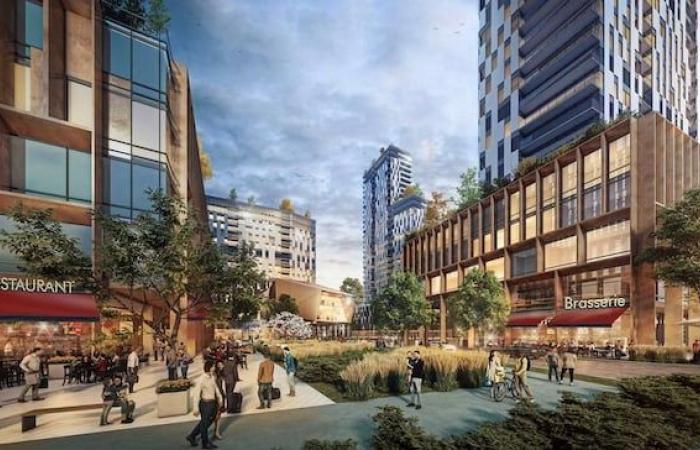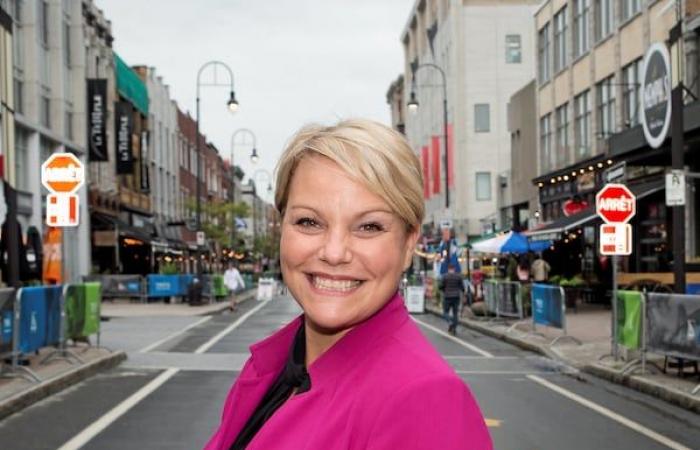“The tramway project is necessary for many reasons, among others to position Quebec economically,” pleaded for the umpteenth time the mayor of Quebec to the media on Wednesday.
This time, the death of the Humaniti real estate development, at the corner of avenue de Lavigerie and boulevard Laurier, feeds the narrative that he has been defending for several months already: we must stop “questioning” the tramway and “ move forward.” “If we believe in the development of this region, it is necessary,” he reiterated.
Earlier Wednesday, - confirmed the definitive abandonment of the Humaniti project, even before its launch.
The joint project of Cogir and the Dallaire Group, valued at more than a billion dollars, will never see the light of day. Announced with great fanfare in November 2020, the real estate development of four towers – one of which was to rise up to 53 floors – was to accommodate around 1,500 residents, around a hotel, office spaces and shops .
Despite the significant loss of these private investments along the route of the future tramway, the mayor of Quebec prefers to look forward. “I don’t want to go back. They [les promoteurs] have made a decision, I trust them,” he commented, believing that another “beautiful project” will one day take its place in the sector.
Quickly, the tram
However, this failure also demonstrates – and above all – the importance of landing a structuring transport network in Quebec, according to him. And quickly.
“From the moment this project does not see the light of day, it has an economic impact on the city, on its capacity to create wealth and on the citizens,” argues Bruno Marchand.
It must be said that the last year has not been an easy one for the tram project. Put on ice in November 2023, he finally obtained a new green light from the Legault government, which promises a final agreement by mid-December.
An uncertainty which weighs down private capital, waiting to be injected.
The city of Quebec would account for approximately 2 billion in private projects promised to come to fruition along the planned route of the tramway, between Le Gendre and Charlesbourg. A “conservative” calculation, in the eyes of Mayor Marchand, which rather figures the “dozens of projects” up to 4 billion in investments over 20 years.
“We cannot miss these considerable sums. We deeply need it for the future and for a long time,” he urges.
“There is an opportunity to be seized, it’s in Quebec that it’s happening.”
— Bruno Marchand, mayor of Quebec
According to him, other announced real estate projects are not necessarily at risk. The interest of promoters, inflated by the most optimistic demographic forecasts in the region, demonstrates that they “have a taste for doing business in Quebec”.
But it will inevitably be necessary to put our foot on the accelerator of the tram, he defends.
“We are on an irreversible path, this project must move forward. It must no longer be called into question, we frankly need it and Quebec needs it too. But now, we have to be predictable and predictable, that means: we stop procrastinating and we move forward.”
The Humaniti project (GOGIR IMMOBILIER MODEL/GOGIR IMMOBILIER MODEL)
“Harmful for development”
For her part, the CEO of the Urban Development Institute of Quebec, Isabelle Melançon, says she was not surprised by the promoters’ decision to put an end to the Humaniti project.
“We’ve been saying it for months: what a developer is looking for is predictability,” she tells Soleilon the sidelines of the Quebec Real Estate Summit at the Convention Center.
The CEO of the Urban Development Institute of Quebec, Isabelle Melançon. (Sylvain Mayer/Archives Le Nouvelliste)
The latter explains that the “dithering” of the Quebec government in the tramway issue has generated a climate of uncertainty for more than one real estate investor.
“There are some who are sitting on their hands and waiting before making investments. Are there any withdrawals going to be made? I don’t know. Is there a latent period? I would tell you that this is what should be worrying.”
“It’s bad for real estate development. Today, we have tangible proof.”
— Isabelle Melançon, CEO of the Urban Development Institute of Quebec
Ms. Melançon adds that it is time to have a “clear timetable” in carrying out the structuring transportation project so that buildings can come out of the ground.
“We are in the middle of a housing crisis. There is a climate crisis happening. We are behind the major cities of the world in public transport. “It has to move,” she says as a message.
A “lesson” to be learned, says Duclos
The case of the Humaniti project is striking, but is not unique. Other major real estate projects have recently been abandoned or put on ice, along the route of the future tramway.
The Brivia Group, a Montreal company, has put its land located at the corner of Chemin de la Canardière and Boulevard Henri-Bourassa up for sale, - reported in early October. The Montreal company was planning a rental project of more than 200 units in this sector of the city before the structuring transport route branches off again towards Charlesbourg.
Likewise, as written The Sun At the end of September, Développements Roussin is waiting to develop a neighborhood of several hundred residential units and employment sites in the Chaudière sector, near the IKEA, until a “final development vision » is finally presented by the City of Quebec.
“The lesson is that […] when we delay these major infrastructure projects for the Quebec region, well that also delays other investments, including investments in housing,” analyzed Jean-Yves Duclos, Quebec lieutenant for Justin Trudeau’s Liberals, on Wednesday.
“The glimmer of hope,” he says, lies in the possibility “that another promoter will take charge provided that the tramway project is relaunched quickly.”
But it’s not just the tramway to explain the failure of certain real estate projects, judges the leader of the official opposition at Quebec City Hall.
“The fact that the tramway project is on hold does not help, but it is not the only reason why there are projects that are not being done in Quebec. There is an economic context and, clearly, a level of confidence which is not there,” analyzes Claude Villeneuve.
The mayor’s political opponent Bruno Marchand believes that the sector remains “full of possibilities.” “We must send the message that Quebec is open for business», encourage M. Villeneuve.







